Evercool designed a cooler with a dual-array
tower heatsink and one unique peculiarity. However, it isn’t the main reason
why we like it. Read our review to find out what that reason is?
The Taiwanese Evercool
Thermal Co., Ltd. has been in the cooling components business for almost 20
years. They have established themselves as a manufacturer of affordable cooling
components including fans for many reference coolers out there and focus on the
entry-level market. Over the years the company has had several products, some
quite weak and some are quite good, but we couldn’t recall even one that would
proudly bear the title of a super-cooler.
A new product has abnormally low price of
Evercool, Silent Shark, will
attempt to change this situation. This cooling device boasts at least one
unique peculiarity, which make it a very interesting product and appealing to
look at. But let's start from the starting point.

Product's
image
Packaging and accessories
Evercool Silent Shark appeared in a large
box with a plastic handle and a clear plastic window in the front of the box,
revealing a portion of the heatsink with two fans:
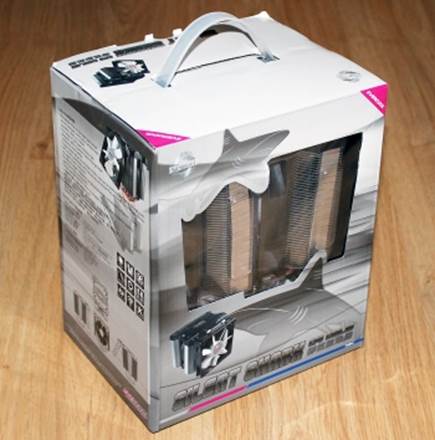
Carrying
products
The back and sides of the box displayed
information related to the product, though there was still enough room for a
couple of sharks with gills on the dorsal fin:
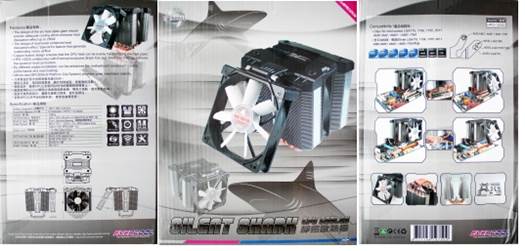
Product
information on box
Inside the box, we found a plastic casing
holding the cooler. The box with accessories bundle is located at the bottom of
that casing:
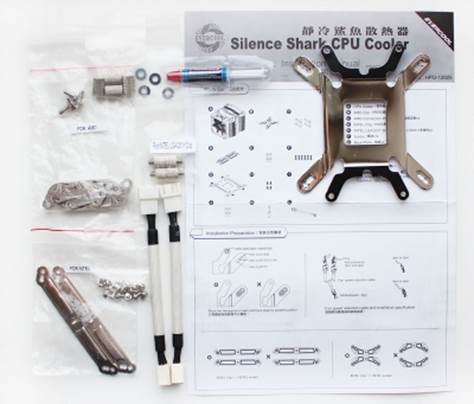
Accessories
and associated equipment
As we can see, there is everything
necessary to successfully install the cooler, including the backplate, thermal
paste with 5 W/(m*K) thermal conductivity and 0.007 ⁰C*in2/W thermal
resistance, manual and adapters with resistors for lowering the fans rotation
speeds.
The cooler is manufactured in China and
sold for $75. It comes with 2 years warranty period.
Design and function
The first impression when you see Evercool
Silent Shark is the its size and weight. This cooler is 165 mm tall, 140 mm
wide and 166 mm long and weighs 1246 grams. All in all, it is a very large and
heavy cooler, like what it was designed:
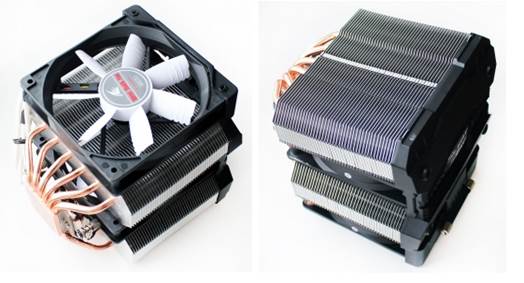
Design
Description
However, the design of the Silent Shark is
not new here. It includes an aluminum heatsink on six copper heatpipes that
pass through copper base. The heatsink is topped by a plastic cap and is
equipped with two cooling fans:
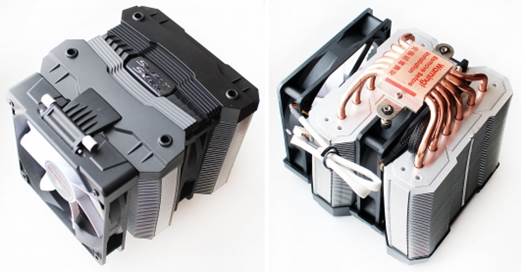
Heatsink
One of the fans is installed between the
heatsink arrays, while the other one – on one of the exterior sides of the
heatsink:
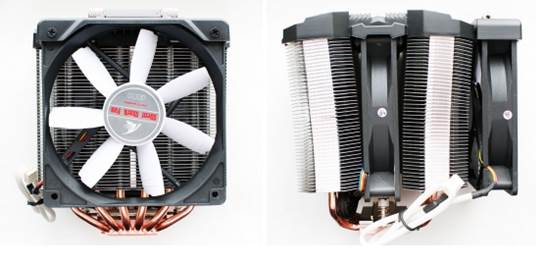
Heatsink's
fans
Each heatsink array consists of 45 aluminum
fins, each measuring 140x45 mm and 0.4 mm thick. The fins are firmly pressed
against the heatpipes 2 mm away from one another.
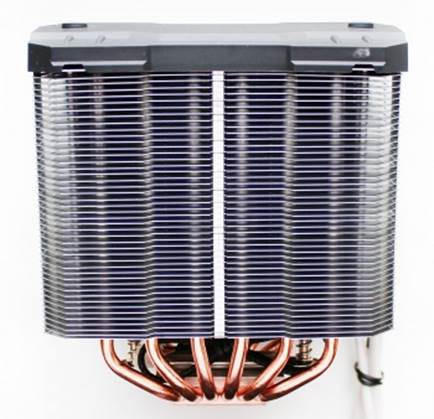
The
heatsink fins
Note that the fins are firmly pressed
against the entire surface of the heatpipes, without the presence of so-called
"lock". This is the most effective method of ensuring proper contact
between the heatpipes and the heatsink fins.
The heatsink arrays are slightly apart from
each other. Evercool refer to this solution as a V-shaped heatsink, but we do
not know the actual practical reasons for that:

The
heatsink base
Meanwhile, I want to point out that the
heatsink is not optimized in any way towards reducing the airflow resistance,
except for a low-profile deepening in the center of the heat sink, which can
hardly be regarded as a truly optimization of this sort.
The heatpipes pierce heatsink arrays along
the same line at 20 mm distance from one another:
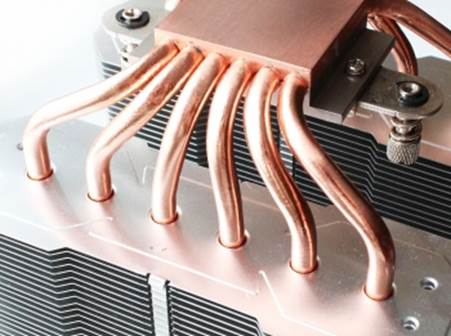
Position
of the heatpipes
The heatpipes are very close to each other
in a special groove in the base of the cooler. Evercool soldered all contact
areas in the base. The base plate measures 40x37 mm and has a very
well-finished surface:
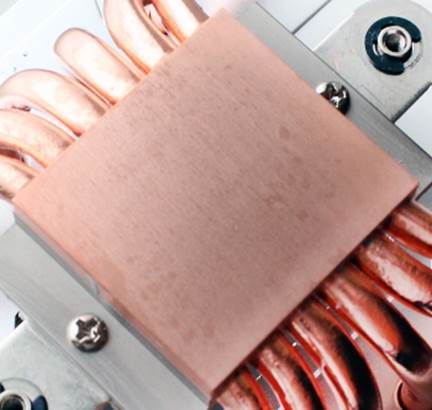
The
design of heatpipes
It is also impeccably even. That as well as
the high pressure hold provided by the cooler retention produce very uniform
thermal paste imprints:
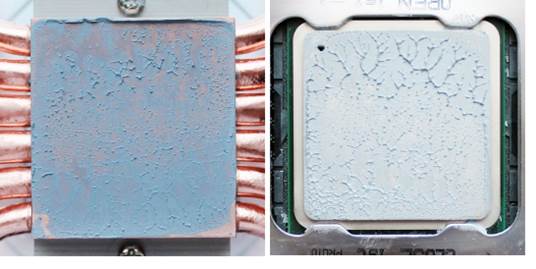
Thermal
paste
Evercool Silent Shark cooler is equipped
with two 120 mm fans which are mounted on the plastic top cover with screws:
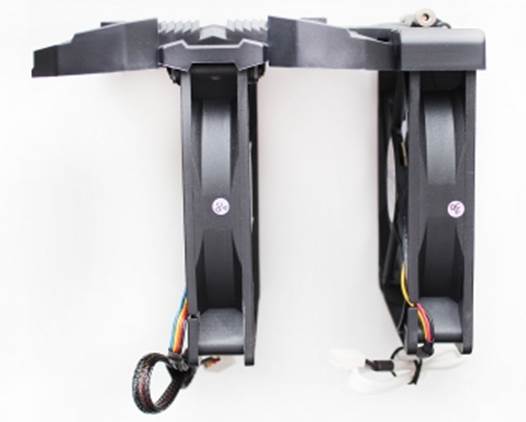
Fan of the device
They are two completely different fan, even
though both of them are manufactured by Evercool:
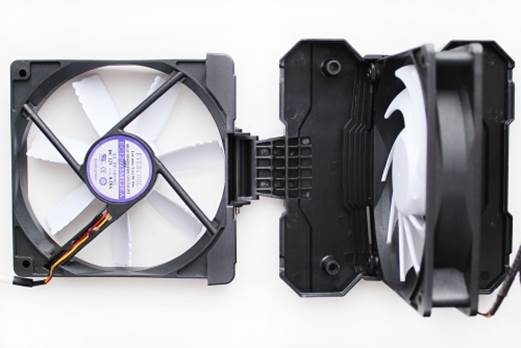
Fan of the device
The external fan impeller has seven flat
blades with “shark fins” on them and is called Silent Shark. As you
may have guessed, this is the reason why the cooling device is named so. The
rotational speed of the fan may not be adjusted and is set at 1400 RPM.
However, our experiment shows that this fan was rotating at 1,670 RPM, 15%
higher than the published specification. The cooler is said to generate noise
levels up to 26 dBA and create airflow at 60.6 CFM.
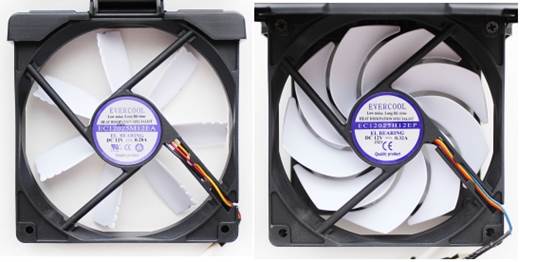
Image
of 2 fans
The second fan (model EC12025H12EP) is
120x120x25 mm in size, but features a completely different type of impeller and
supports PWM rotation speed adjustment. Its fan operates within the rotational
speed from 800 RPM to 2,200 RPM. The maximum noise level is officially declared
as 16 dBA, it seems that the only noise at the minimum fan speed. Created
airflow is 60.6 CFM. Both fans of Silent Shark Evercool cooler are built with
fluid dynamic bearings that should last at least 60,000 hours.
Now we will discuss the cooling fan, it is
time to reveal that unique peculiarity of the Evercool Silent Shark cooler that
was mentioned before. Specifically, it allows placing the exterior fan at a
30-degree angle to the heatsink array it is attached to:
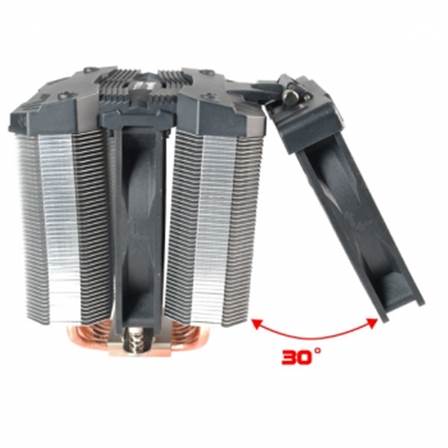
Installing
two fans
This allows directing tje airflow to the
memory modules and heatsink on the voltage regulator components around the
processor socket thus lowering their operational temperature. Unfortunately,
Evercool doesn’t mention how greatly this measure affects the efficiency of the
actual CPU cooling.